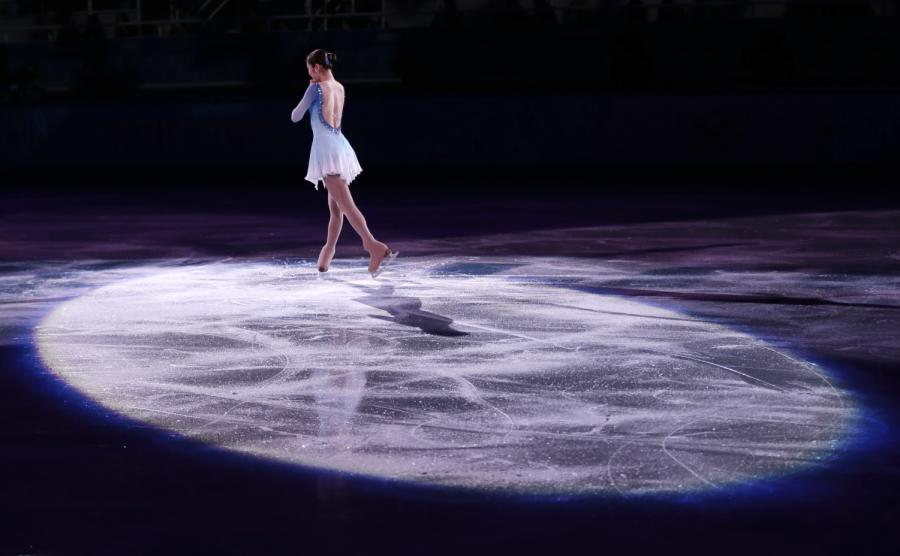Opinion: Kamila Valieva isn’t a cheater, she’s manipulated
Credit: Courtesy of Flickr user {QUEEN YUNA}
WSPN’s Delia Caulfield reflects on the recent banned substance scandal with the Russian Figure Skating Team.
February 28, 2022
The stage has been set for the 2022 Beijing Winter Olympics, showcasing athletic superstars from across the globe. For most athletes, the Olympics is the peak of their athletic careers, testing them both physically and mentally. Despite the hard work and dedication that most athletes commit to their sport, our world is still plagued by the prevalence of cheating in order to win the gold.
This year, all eyes were on 15-year-old Russian figure skater Kamila Valieva as she dazzled the world with her grace and talent. Valieva’s routines were evidently next level, consisting of some of the toughest moves in the sport, such as the quadruple axel, making her the first woman to ever land this move in the history of the Olympic Games. In addition, Valieva’s beautifully refined technique set her apart from other competitors, shining a spotlight on her as one of the youngest female figure skater competitors at this year’s Olympic Games.
Valieva had a stumble or two throughout her routines, but it didn’t matter. Her recovery is what made her shine the brightest, as she immediately picked herself up and delivered a performance like we’ve never seen before.
Despite Valieva’s immense promise and talent, it was discovered recently that the Team Russia superstar tested positive for a banned substance, trimetazidine, a month before she helped win the team event for Russia. This drug is often used to treat conditions such as vertigo and prevent angina attacks from occurring, and it was banned by the World Anti-Doping Agency because it has been proven to help strengthen one’s endurance and blood flow efficiency.
Due to this discovery, Valieva has been suspended from receiving medals at the Winter Olympics. However, Valievia is still allowed to compete.
Despite this beacon of light for Valieva, the backlash she is facing overpowers any elation she felt in the past. Countries from across the world are infuriated with the actions of the Russian Figure Skating Team and Valieva herself.
In addition to having the world pitted against her and her figure skating career, albeit for good reason, U.S. track phenomenon Sha’Carri Richardson has been outspoken regarding Valieva’s case. Richardson was set to compete, and place highly, at this past year’s Tokyo Summer Olympics. However, a positive drug test for marajuana ultimately ended Richardson’s season and her Olympic dreams. So, it is understandable that Richardson would be infuriated with the decision to allow Valieva to continue competing, despite testing positive for performance enhancers.
However, the two cases are different in the sense that Valieva is a minor. Athletes under the age of 16 typically aren’t held responsible in most doping cases; therefore, Valieva has more rights under the anti-doping rules than individuals over the age of 16.
I believe that consequences should either be enforced for everyone or no one; however, it’s tough for me to believe that Valieva decided on her own to take performance enhancers when she has a coach who is known for manipulating her athletes.
This is not to say that the decision surrounding Richardson’s case was justified, as myself and many others were upset to hear that she wouldn’t be competing and were shocked to hear of her punishment. However, the rules and guidelines enforced by the World Anti-Doping Agency make these cases two separate issues.
Yes, Valieva was most likely aware of her intake of these banned substances; however, instead of placing all the blame on a 15-year-old girl, we should be more focused on the puppet masters who have been involved in multiple issues of misconduct throughout the years.
This is why I am not surprised to learn of this news. True, it isn’t every day that a young superstar tests positive for performance enhancers; however, this isn’t the first time a scandal has occurred involving a Russian Olympic team.
The Russian Olympic team has been tangled in multiple doping scandals, notable ones including the 2014 incident at the Winter Olympic Games and the 2018 incident, which resulted in Russia being banned from the Olympics for four years. Despite this, Russia has still competed in certain events during these games and has continued to reject learning from their consequences.
Eteri Tutberidze, the head coach at Sambo 70 skating club in Moscow, Russia, trains many young figure skaters, such as Valieva. Tutberidze was born in Moscow, but moved to the United States to perform in ice shows in the 1990s.
Eventually, Tutberidze hung up her skates and instead was able to build a figure skating empire, breeding some of the most talented figure skaters in the world. World renowned stars such as Yulia Lipnitskaya, who helped Russia win the gold in 2014, was the second-youngest gold medalist of her time, and have been coached by Tutberidze ever since they were young.
Although incredible skating icons have been produced by Tutberidze, their careers have almost always been cut short. This is due to the grueling training methods that Tutberidze relies on that are often frowned upon in the figure skating community, as her idea of ‘helping’ her students consists in the form of a constant mental and physical pressure. Her training is intense, and on average, Tutberidze’s students often stop competing in their teenage years.
This isn’t necessarily because they willingly retired, but because they physically and mentally couldn’t face the pressures of competing. Stars such as Lipnitskaya and former gold medalist Alina Zagitova both retired before the age of 20, reporting that they couldn’t handle the amount of stress placed on their bodies and the harsh training process that the Russian team practices. In addition, many Russian figure skaters, such as Lipnitskaya, admitted to struggling with anorexia throughout their skating careers.
Lipnitskaya definitely isn’t the first Russian skater to struggle with eating disorders, as the pressure to fit a certain physique weakened the athletes’ physical health. By the time these Russian superstars reach their high teens, their bodies simply can’t handle the constant pressure being placed on them, and are forced to hang up their skates once and for all.
Tutberidze’s mental manipulation of her skaters has gone on for far too long, and it’s about time that the spotlight is placed on her instead of her athletes. This isn’t good coaching, this is abuse.





![Last Wednesday, the Wayland School Committee gathered to discuss a number of topics regarding the health curriculum and Innovation Career Pathway course. Another large topic of conversation was the ways to potentially mitigate distracting cell phone usage. "These [phones] are going to distract your learning and social relationships," Superintendent David Fleishman said. "That's concrete right there."](https://waylandstudentpress.com/wp-content/uploads/2025/06/Screenshot-2025-06-04-at-9.49.31 PM-1200x886.png)

























